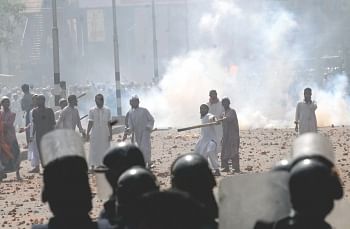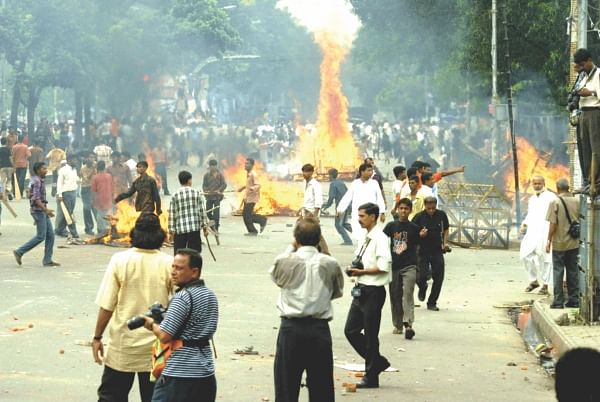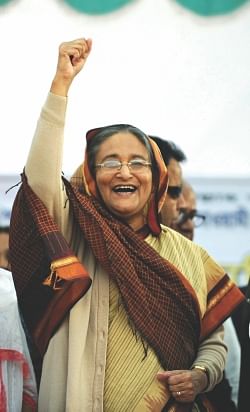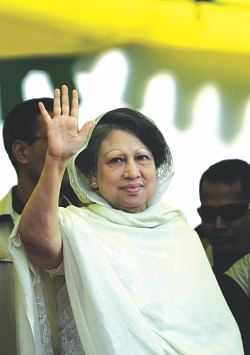| Home - Back Issues - The Team - Contact Us |
 |
| Volume 10 |Issue 38 | October 07, 2011 | |
|
|
Special Feature Back to Square One The country might face a bleak future if a political consensus Shakhawat Liton Now and Then
On December 6, 1993, at a rally at Bangabandhu Avenue in the capital, Awami League chief Sheikh Hasina said the next parliamentary elections must be held under the caretaker government (CG) system. She also asked the then BNP-led government to step down, allowing the polls to be held under the CG. Otherwise, Hasina, also the then opposition leader, threatened to wage a mass movement countrywide against the then regime. The response came the same day from the then Prime Minister Khaleda Zia who rejected the demand for CG in the parliament, urging the main opposition AL to return to parliament and speak what they had to say. She also urged the opposition to shun the path of hartal and street agitations. Later on October 1, 1994, at a public rally at Manik Mia Avenue Khaleda, the then ruling BNP chairperson, categorically said, "Election must be held under the elected government as the caretaker government is against the constitution." Both the rival camps gradually reached to an uncompromising level, shutting the door for an amicable solution to the growing political crisis over the introduction of the CG. Finally, Khaleda Zia had to concede to the demand for the "unconstitutional" CG on grounds of political reality at that time. But in three years---1994 to 1996, the country's economy and people had to feel the heat of violent street agitations including blockade, non-cooperation movement and 96 days of hartal enforced by the then opposition parties led by the AL to meet their demands.
Not only that, amid the boycott of agitating political parties including the AL, Jatiya Party and Jamaat-e-Islami, a farcical parliamentary election was held on February 15, 1996 spending the tax payers' money. The sixth parliament constituted through the polls lasted only 11 days. The only task it performed was introduction of the caretaker government by amending the constitution. Now, it seems, we are back to square one. On June 28, 2011, the PM Sheikh Hasina said in the parliament that unelected people would never be given the opportunity again to assume power and destroy democracy. She urged opposition leader Khaleda Zia to return to parliament and say whatever she had to say on the CG issue. Immediately after the passage of the 15th amendment June 30, abolishing the CG, Hasina took the parliament floor and said her government had ensured “empowerment of people, and their democratic and voting rights” through amending the constitution. The same day, at a press conference Opposition Leader Khaleda said, "All the possibilities of holding free, fair, neutral and competitive elections are now gone.” In the latest development, at a rally at Nayapaltan on September 27, 2011, BNP chief Khaleda said, "A caretaker government is a must for acceptable polls." She also warned the government that her party and allies would allow no general election without the CG system reinstated. Next day, AL General Secretary Syed Ashraful Islam at a press conference said there was no need for the CG and urged the BNP to prepare for the next elections which would be held under the present government. Finally, PM Hasina at a press conference on October 1 categorically said that the tenth parliamentary election would be held without a CG, and it would be free and fair. “BNP has to participate in that election if it is to remain in politics. People want election; they want to practise their constitutional right to vote.” Future remains bleak AL and BNP have swapped positions. The BNP has announced that it would gear up the agitation to restore the provision for the CG while the ruling AL is preparing to go for polls without reinstating the CG. All prevailing signs indicate that both the camps are gradually heading towards an uncompromising situation, shutting the door for an amicable solution to the political crisis, allowing it to deepen farther.
In the wake of already a widened political gap over the CG issue, political analysts are continuously crying for the need to reach a consensus between the AL and BNP through dialogue on holding the next polls in a free and fair manner in order to avert a political crisis. "If the two major political parties do not reach a consensus on the modalities of the next spate of elections, the nation will surely be up against political conflict," Advocate Sultana Kamal, also a former adviser to a CG, told The Daily Star on October 1. Talking to The Daily Star the same day Dr Akbar Ali Khan, a former adviser to CG, stressed the need for participation of the major party in the next election, which could be held under either an interim government or a political government, for its acceptability. Both Dr Khan and Advocate Sultana have gained a lot of experience negotiating with two archrivals AL and BNP to break the electoral stalemate developed at the end of 2006 centring the ninth parliamentary polls. Finally, they resigned along with two other advisers on December 111, 2006 seething with frustration over the then President and Chief Adviser (CA) Iajuddin Ahmed's frequent unilateral actions on election issues. It was crystal clear that Iajuddin was acting on advice of the BNP at that time. The four advisers' resignation deepened the electoral stalemate, pushing the country into more violence. And finally, the armed forces intervened. Iajuddin resigned as the CA, his advisers also followed suit. Then the president declared a state of emergency on January 11, 2007 which was considered the last ditch of effort to avert political violence centring on the parliamentary polls scheduled for January 22 amid boycott of the AL-led grand alliance. The army-backed CG led-by Fakhruddin Ahmed ruled the country around two years keeping the state of emergency in force. The constitution did not allow the regime to remain in office for around two years, but they successfully remained in office. It was a political reality. Stringent constitutional provisions alone cannot prevent extra-constitutional takeover. The political culture needs major reform to consolidate and strengthen the base of democracy. Unfortunately, effective measures to this effect are still not visible in the political horizon. The PM on October 1, however, said that the Election Commission would be reconstituted and strengthened through discussions with all stakeholders including the main opposition BNP to ensure free and fair elections. The PM's announcement deserves kudos. But considering the country's acrimonious political culture, it is difficult to have confidence in the premier's announcement as the events centring the cancellation of the provision of the CG system in the constitution questioned the ruling AL's sincerity in resolving the now growing electoral stalemate. So, it is usual that many people will now predict that the PM, by making the announcement, in fact, has done this to put pressure on the BNP. But it is almost certain that BNP will not respond to the government's call to sit across the table to discuss reconstitution of the EC once the tenure of the current EC expires in February, 2012, as restoration of the CG has become the BNP-led alliance's core demand. Unless and until, any dramatic development takes place in the coming days, the possibility of consensus on any electoral issue between the AL and BNP will remain bleak. Imagine now what will be happening in the country's politics regarding the 10th parliamentary election, which will be held at the end of 2013 or early 2014. If BNP sticks to its guns, it is almost certain that the BNP-led alliance will boycott the next election if it is held under the AL-led government. If this happens, how will the political landscape look like? Without the participation of the BNP-led alliance, it might be possible to hold the next general election as the previous BNP-led government did on February 15, 1996. In that case, the Ershad-led Jatiya Party, now a key component of AL-led grand alliance, might contest the polls independently and may dream of emerging as the main opposition in the next parliament. Some other small parties and individuals may also join the election to have some advantages in absence of the BNP-led alliance in the electoral race. The big question is: what will be the fate of that election? Will it get credibility? And what will be the fate of the parliament to be constituted through that election? The public knows the answers. Politicians who are in power and are in opposition should apply their minds and brains to carefully find the answers to the questions. They should revisit the fate of February 15, 1996 farcical election and the parliament constituted through it and the consequences of their failure to break the electoral stalemate at the end of 2006. Reassess your strategy
Many of the AL and BNP leaders are well aware of the consequences. They have the political wisdom needed to avert any possible turmoil. But they seem unable to exert their authority to determine the country's political future course of actions as “some other players” are active behind the curtains and are successfully encouraging and also misleading Hasina and Khaleda to keep the animosity between them alive. Whenever there is a political turmoil, “those players” take personal advantages in undue ways. Who are these players? People who follow political developments of the country know them very well. Some of them belong to the inner circle of the two ladies, posing as sycophants while others are in the government administration and in other sectors. All of them are taking benefits from confrontational politics. Former military dictators Zia and Ersahd grabbed state power taking advantage of such confrontational politics. During the past caretaker government regime some army officers became highly ambitious and abused power, and were involved in many controversial acts for their personal benefit, victimising many people including politicians. Some unscrupulous bureaucrats in the civil administration always look for weaknesses in the government's political will so that they can go on plundering the country. It is evident that efforts to establish the rule of law and ensure good governance have been hindered seriously due to confrontational politics. The absence of a consensus between the ruling and opposition camp always opens new windows of opportunity for these players. Therefore, before the situation gets further complicated, both the ruling and opposition parties should reassess their present strategy and move forward by averting the growing electoral stalemate over the CG issue. People still want to believe that their leaders are doing politics to ensure people's rights to better lives. It is up to the leaders to honour such trust.
Copyright
(R) thedailystar.net 2011 |



